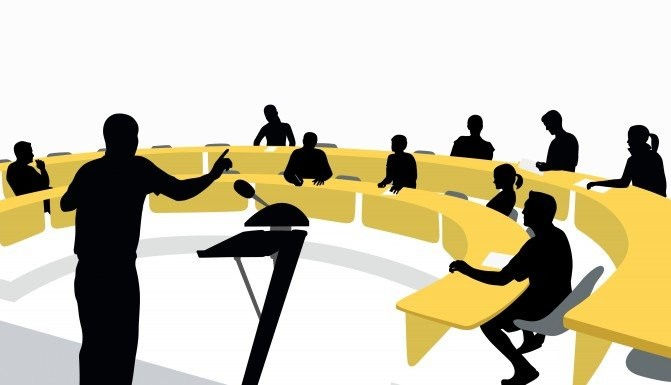
Before there is an insurrection from the accreditation wing of the Sterile Processing world, let me just come out and offer a disclaimer right here at the outset -- I support continuing education credits. I think they give our industry, in particular, a helpful dose of standardization and incentive for growth in knowledge and professional expertise. And just like the rest of you, I meticulously keep track of my own annual CEUs for re-certification submissions every year for my CRCST, CIS, CER, and CHL credentials. So this post isn't as much an argument against a CEU-culture in toto as it is a plea for CEUs to be a single pillar, not the foundation, of our overall conception of Sterile Processing education.
So, with that out of the way, what's my beef with a solo CEU-culture? Allow me to argue the case:
A Part, Not the Whole: The Risk of CEU Mission Drift
The mission and purpose of most industry continuing education units (CEUs) is to keep the individual holding a particular certification or license up to date with a baseline knowledge of current standards and best practices. And as I noted in the introduction to this post, that is not, by itself, a bad thing. Particularly for industries such as medical device reprocessing where regulations and technology changes at a rapid pace, it is important that certification holders retain the value of that credential year after year. CEUs provide that on-going, education-centered value.
The problem comes when that mission for credentialing consistency begins drifting into areas where is should not be, or at least where it should not be the authoritative force for gauging educational value. If you've made it this far and are still asking yourself, "What in the heck is this guy talking about?," let me get a little more practical about how this CEU mission drift occurs.
Education in the Trenches

Every Sterile Processing professional knows that learning is a big part of the job, especially during your first 90 days as a new technician. There are thousands of instruments to learn, processes to master, documentation habits to create, and on and on. During these periods of orientation most departments dedicate time, personnel, and training materials to ensure the new employee is properly acclimated to their position. But then what? What happens on day ninety-one?
First, learning continues because, in one sense, learning is inevitable. As the British author and theologian, GK Chesterton argued, "It is impossible for anything to signify nothing," and in the case of education, it is impossible for humans not to learn something from anything. We learn good ways of doing things and bad ways of doing them, quick ways and circuitous ways, simple ways and complex ways, right ways and wrong ways -- but we learn, nonetheless.
And secondly, in many CS/SPD departments, after day ninety-one the main thrust of structured education is picked up by CEU programming. The more certified your department is, the more likely this is to be true. Your primary "educational" events or inservices carry with them the accredited stamp of "good for 2 CEUs!" So you learn about the care and handling of stainless steel instrumentation a couple of times a year, sprinkle in some laparoscopic testing in-servicing, with a pinch of the fundamentals of steam sterilization. Again, all of these are positive and often profitable educational opportunities for your team, but I want to argue for something more.
The Eternal Orientation: An Indispensable Education of Professional and Process Development
Here's the exhortation. Keep bringing in CEU programming and keep sending your teams outside to receive it. But make CEUs the sideshow and not the main event. Instead, approach your CS/SPD educational needs as if everyone were on eternal orientation.

In addition to focusing on broad themes such as stainless steel care and handling, spend a weekly staff meeting teaching your techs the best way to hold multiple ring-handled instruments in one hand. After you bring in a representative to speak on biological testing, hold a seminar for your team on crafting competitive resumes. Talk about how to have difficult conversations with vendors, show them how to organize their workstation to reduce the chance of errors, and discuss how department signage can either increase or decrease the perception of professionalism visitors get when they enter your world. None of these presentations will be polished or accredited, but boy are they important.
We miss the mark in CS/SPD if we act as if the only true, real, and valuable education we can offer our teams has to come from some outside accreditation agency with CEUs attached.
To paraphrase the Chesterton quote I referenced above, everything means something and everything matters. We miss the mark in CS/SPD if we act as if the only true, real, and valuable education we can offer our teams has to come from some outside accreditation agency with CEUs attached. That just could not be further from the truth. Internal department, customer, and workflow process knowledge is the kind of education that can really take your team from good to great. There are many CRCST and CBSPD certified technicians out there. But not all are created equal. So what sets them apart? I believe the answer starts here, with an holistic, on-going vision of education that values excellence as much or more as we value CEUs. This kind of technician-centered approach to developing department specific experts is absolutely indispensable if we are going to be the best CS/SPD departments that we can be.
Happy educating, my friends.
What say you?
Hank Balch
Beyond Clean © 2019


Kommentare